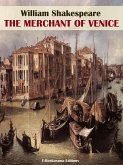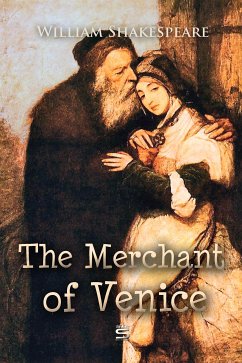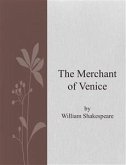The Merchant of Venice - William Shakespeare - The Merchant of Venice is a 16th-century play written by William Shakespeare in which a merchant in Venice named Antonio defaults on a large loan provided by a Jewish moneylender, Shylock. It is believed to have been written between 1596 and 1599. Although classified as a comedy in the First Folio and sharing certain aspects with Shakespeare's other romantic comedies, the play is most remembered for its dramatic scenes, and it is best known for Shylock and his famous demand for a "pound of flesh" in retribution, as well as its "Hath not a Jew eyes?" speech on humanity. As a result a debate exists on whether the play is anti-Semitic or not. Also notable is Portia's speech about "the quality of mercy". Bassanio, a young Venetian of noble rank, wishes to woo the beautiful and wealthy heiress Portia of Belmont. Having squandered his estate, he needs 3,000 ducats to subsidise his expenditures as a suitor. Bassanio approaches his friend Antonio, a wealthy merchant of Venice, who has previously and repeatedly bailed him out. Antonio agrees, but since he is cash-poor – his ships and merchandise are busy at sea to Tripolis, the Indies, Mexico and England – he promises to cover a bond if Bassanio can find a lender, so Bassanio turns to the Jewish moneylender Shylock and names Antonio as the loan's guarantor. Antonio has already antagonized Shylock through his outspoken antisemitism and because Antonio's habit of lending money without interest forces Shylock to charge lower rates. Shylock is at first reluctant to grant the loan, citing abuse he has suffered at Antonio's hand. He finally agrees to lend the sum to Bassanio without interest upon one condition: if Antonio were unable to repay it at the specified date, Shylock may take a pound of Antonio's flesh. Bassanio does not want Antonio to accept such a risky condition; Antonio is surprised by what he sees as the moneylender's generosity (no "usance" – interest – is asked for), and he signs the contract. With money in hand, Bassanio leaves for Belmont with his friend Gratiano, who has asked to accompany him. Gratiano is a likeable young man, but he is often flippant, overly talkative, and tactless. Bassanio warns his companion to exercise self-control, and the two leave for Belmont. Meanwhile, in Belmont, Portia is awash with suitors. Her father left a will stipulating that each of her suitors must choose correctly from one of three caskets, made of gold, silver and lead respectively. Whoever picks the right casket wins Portia's hand. The first suitor, the Prince of Morocco, chooses the gold casket, interpreting its slogan, "Who chooseth me shall gain what many men desire", as referring to Portia. The second suitor, the conceited Prince of Aragon, chooses the silver casket, which proclaims, "Who chooseth me shall get as much as he deserves", as he believes he is full of merit. Both suitors leave empty-handed, having rejected the lead casket because of the baseness of its material and the uninviting nature of its slogan, "Who chooseth me must give and hazard all he hath". The last suitor is Bassanio, whom Portia wishes to succeed, having met him before. As Bassanio ponders his choice, members of Portia's household sing a song that says that "fancy" (not true love) is "engend'red in the eyes, / With gazing fed"; Bassanio chooses the lead casket and wins Portia's hand.









